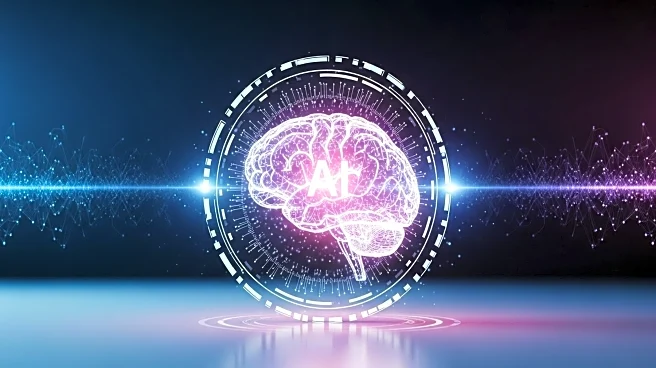What's Happening?
At TechCrunch Disrupt 2025, leaders from TwelveLabs, Wonder Dynamics, and Pocket Entertainment are exploring the integration of artificial intelligence (AI) in creative fields such as storytelling, film, and media. The event highlights how AI is becoming a co-creator alongside humans, reshaping the way stories are told and media is produced. Key figures like Prateek Dixit of Pocket Entertainment are pioneering audio-first storytelling by combining AI tools with human creativity to expand global storytelling. Nikola Todorovic of Wonder Dynamics is developing AI software that simplifies the animation of 3D characters, while Soyoung Lee of TwelveLabs is advancing video search and understanding through sophisticated video foundation models. This convergence of AI and human creativity is set to redefine the creative industries, offering new ways to design experiences and engage audiences.
Why It's Important?
The integration of AI into creative industries signifies a major shift in how content is produced and consumed. By acting as a collaborator, AI can enhance human creativity, leading to more innovative and diverse storytelling methods. This transformation could impact various stakeholders, including content creators, media companies, and audiences, by providing new tools and platforms for creative expression. The potential for AI to streamline production processes and reduce costs could also benefit businesses financially. As AI continues to evolve, it may democratize content creation, allowing more individuals and smaller companies to compete in the media landscape.
What's Next?
As AI continues to integrate into creative processes, stakeholders in the media and entertainment industries may need to adapt to new technologies and methodologies. This could involve investing in AI tools, training staff to work alongside AI, and exploring new business models that leverage AI's capabilities. The ongoing development of AI technologies will likely lead to further innovations in how stories are told and consumed, potentially opening up new markets and opportunities for growth. Industry leaders and policymakers may also need to address ethical considerations and ensure that AI is used responsibly in creative contexts.
Beyond the Headlines
The use of AI in creative industries raises important ethical and cultural questions. As AI becomes more involved in content creation, issues such as intellectual property rights, authorship, and the potential for bias in AI-generated content may arise. Additionally, the cultural impact of AI-driven storytelling could influence societal norms and values, as AI has the power to shape narratives and influence public perception. Long-term, the collaboration between AI and human creativity could lead to a redefinition of what it means to be an artist or creator in the digital age.









